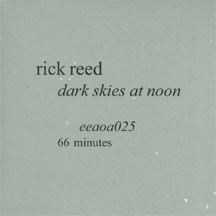 Texan Rick Reed is a true multi-instrumentalist ofexperimental traditions. His primarycompositions, for sine wave, short-wave and Moog, represent mastery of thetexturally-intense, sculptural minimalism nowadays crunched down from the Powerbooktable.
Texan Rick Reed is a true multi-instrumentalist ofexperimental traditions. His primarycompositions, for sine wave, short-wave and Moog, represent mastery of thetexturally-intense, sculptural minimalism nowadays crunched down from the Powerbooktable.
Reed’s droning, crackling, lulling, screeching patchworksbecome as aurally-demanding as a Hecker or a Pita, while projecting also anout-of-the-box bigness and a vaguely psychedelic warmth, or a frayed (as opposedto diced or pixilated) edge that is, to my ears, very unique . The music here is not straight drone, or asuni-directional as that word might imply; it does not creep long, plunge deep,or run up towards abandon. Pure tones,static loops, and granulated washes collect and regress to form a looming massof nearly symphonic austere sound bites, conjuring the spirit of writhing,head-cleaning “noise” music but projecting a cleaner vision, a high-lonesome,spectral conglomerate of disembodied machines.
The sound is spacious and arch-ful, though never fully quiet, as ifthere is continual off-site energy blowing through so that all lost isreplaced, reflected, or refracted through a brilliant sensitivity to textureand pitch. Field recordings, violin, andthe familiar guitar of Keith Rowe avoid becoming focus and instead evolvewithin the mix, rounding out the organism of Reed’s compositions, thehyper-real connectedness of suchshrill and singularly uninviting tones and waves. DarkSkies At Noon is hands-down the best release of any Reed involvement thatI’ve heard, and, in a limited pressing of 328, it is something to be treasured.
samples:
Read More

